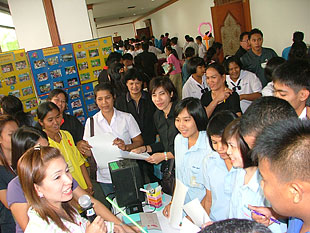HIV Vaccine Awareness Day
Military medical researchers have a long and successful history of battling infectious disease threats, and that tradition continues today in HIV vaccine research. Last year, the Army announced that a clinical trial (RV144) involving more than 16,000 people in Thailand demonstrated a modest ability to protect against HIV infection, reducing the number of infections by about a third.
This was the first time in over two decades of research that a vaccine has shown any ability to prevent HIV infection. The result from RV144, albeit a modest one, is a significant scientific milestone that we can build upon for future, more effective HIV vaccines.
We hope to use data from RV144 to determine the specific immune responses the body needs to protect itself from HIV. The results of the RV144 trial have already prompted scientists to rethink how they approach and test a vaccine to protect against HIV. Our program is collaborating with researchers around the globe to dissect the results from this trial to inform basic research and design future clinical trials to translate a scientific milestone into an eventual public health tool.
 As we mark HIV Vaccine Awareness Day on May 18, I'd like to acknowledge the dedicated people who make this type of scientific progress possible. RV144 involved more than 16,000 volunteers in Thailand, along with hundreds of scientists, health workers, trial staff and members of the U.S. Military HIV Research Program's team.
As we mark HIV Vaccine Awareness Day on May 18, I'd like to acknowledge the dedicated people who make this type of scientific progress possible. RV144 involved more than 16,000 volunteers in Thailand, along with hundreds of scientists, health workers, trial staff and members of the U.S. Military HIV Research Program's team.
Thirty years ago the World Health Organization declared that smallpox? one of the most devastating diseases in human history? had been eradicated after an intense surveillance and global vaccination campaign. It is my hope that a similar statement can one day be made about HIV, which is currently the second largest infectious disease killer in the world.
HIV has taken the lives of nearly 27 million people, and it is estimated that more than 33 million people were living with HIV at the end of 2008. It poses a great threat to public health and stability in countries where it is prevalent. This disease must be stopped, and as history has shown us, an effective vaccine is the ultimate solution to control a pandemic.
For more information on the U.S. Military HIV Research Program at the Walter Reed Army Institute of Research, please visit www.hivresearch.org.
COL Nelson Michael
Director, Division of Retrovirology
Walter Reed Army Institute of Research
U.S. Military HIV Research Program (MHRP)
 An official website of the United States government
An official website of the United States government
 ) or https:// means you've safely connected to the .mil website. Share sensitive information only on official, secure websites.
) or https:// means you've safely connected to the .mil website. Share sensitive information only on official, secure websites.



